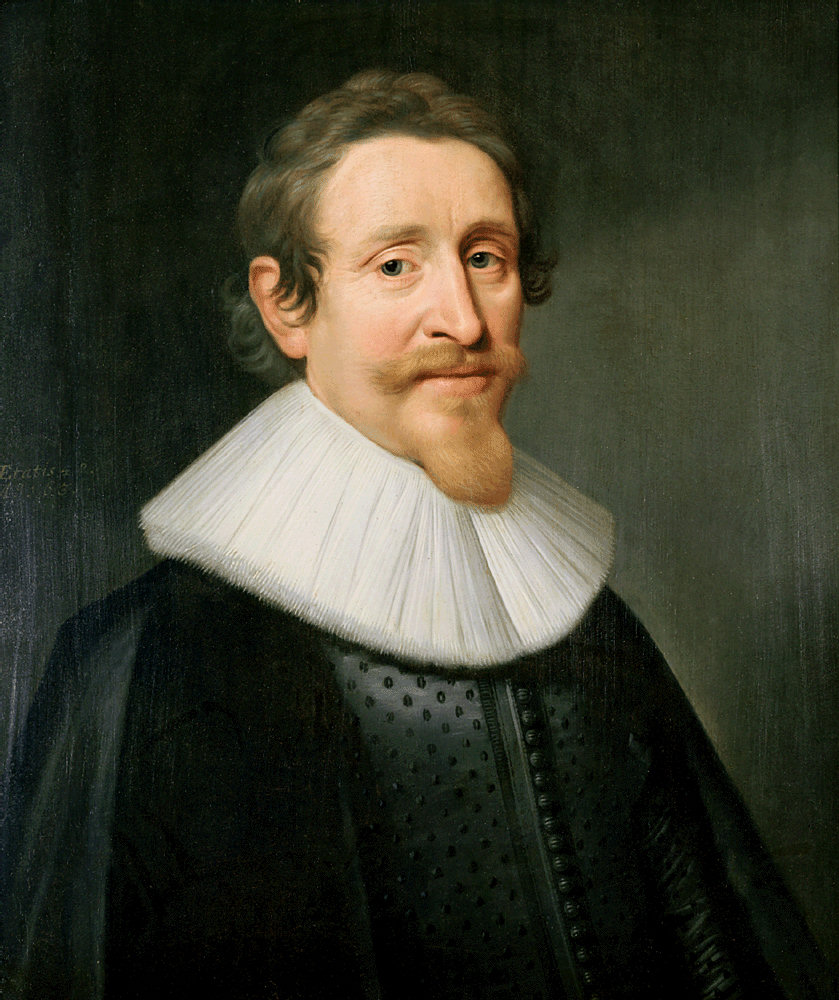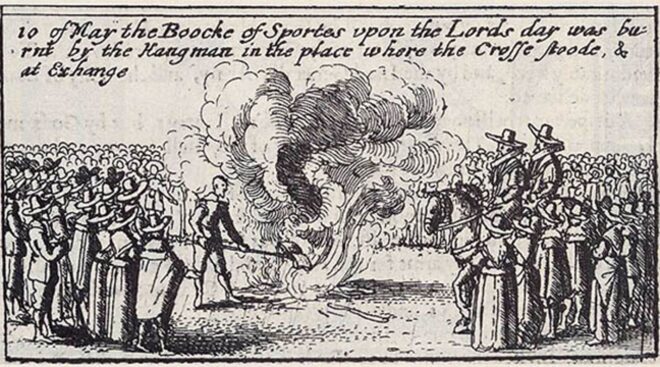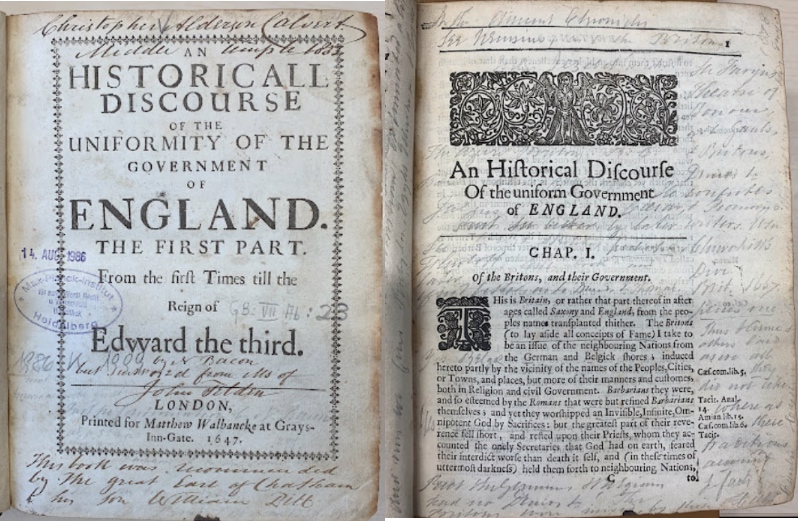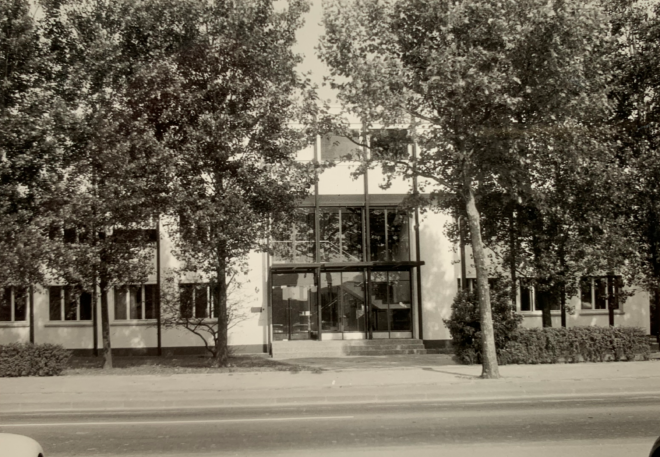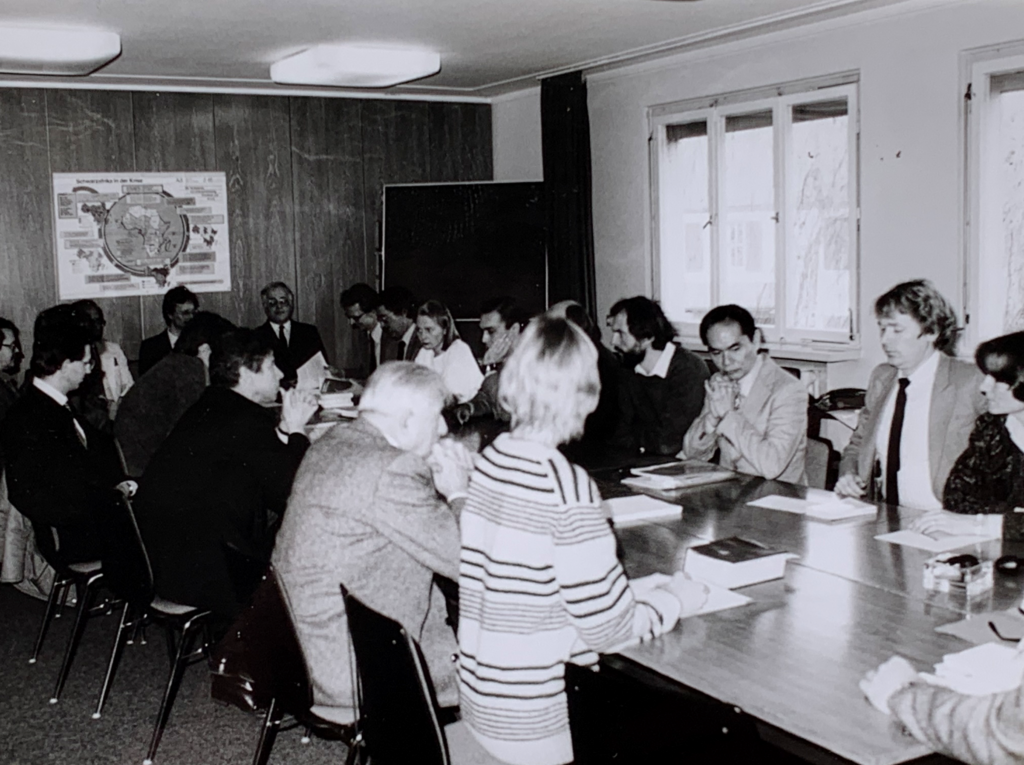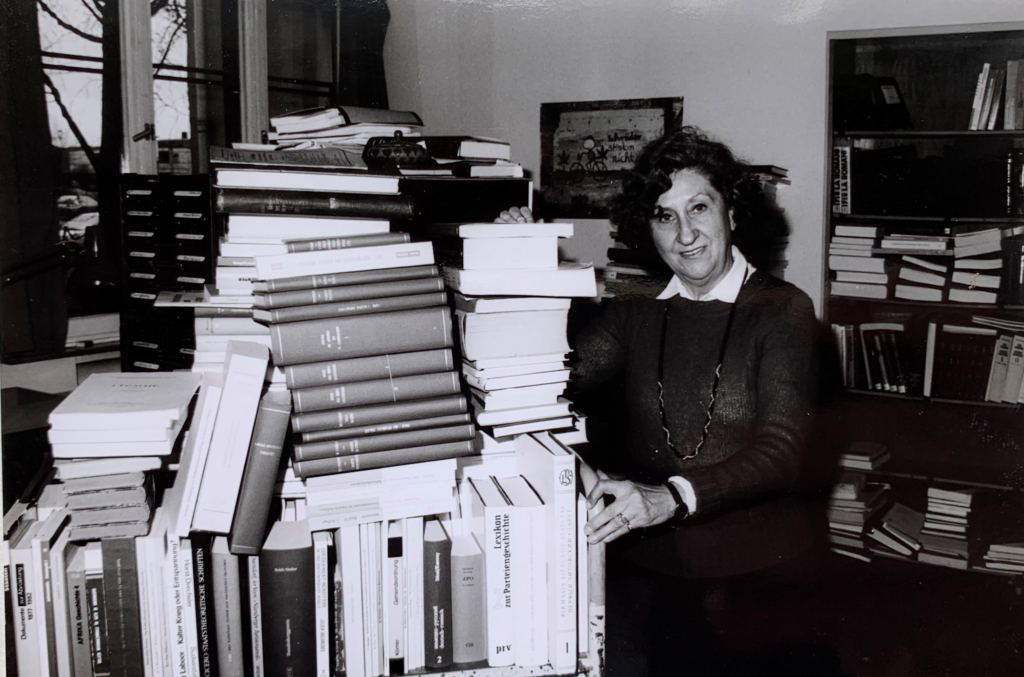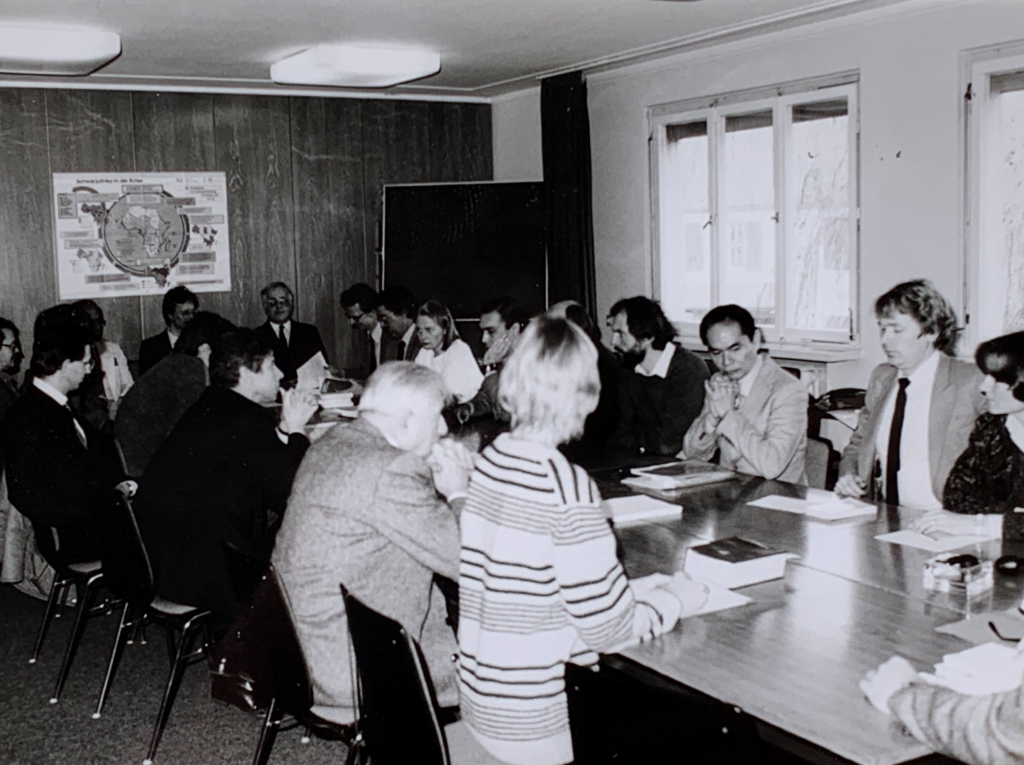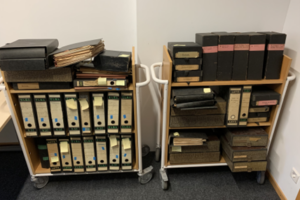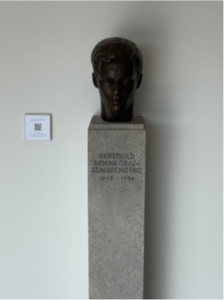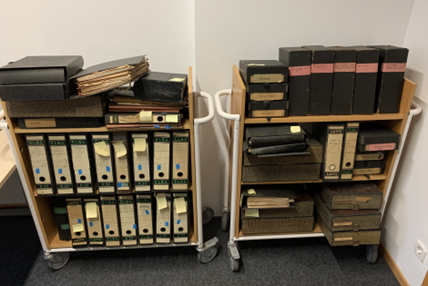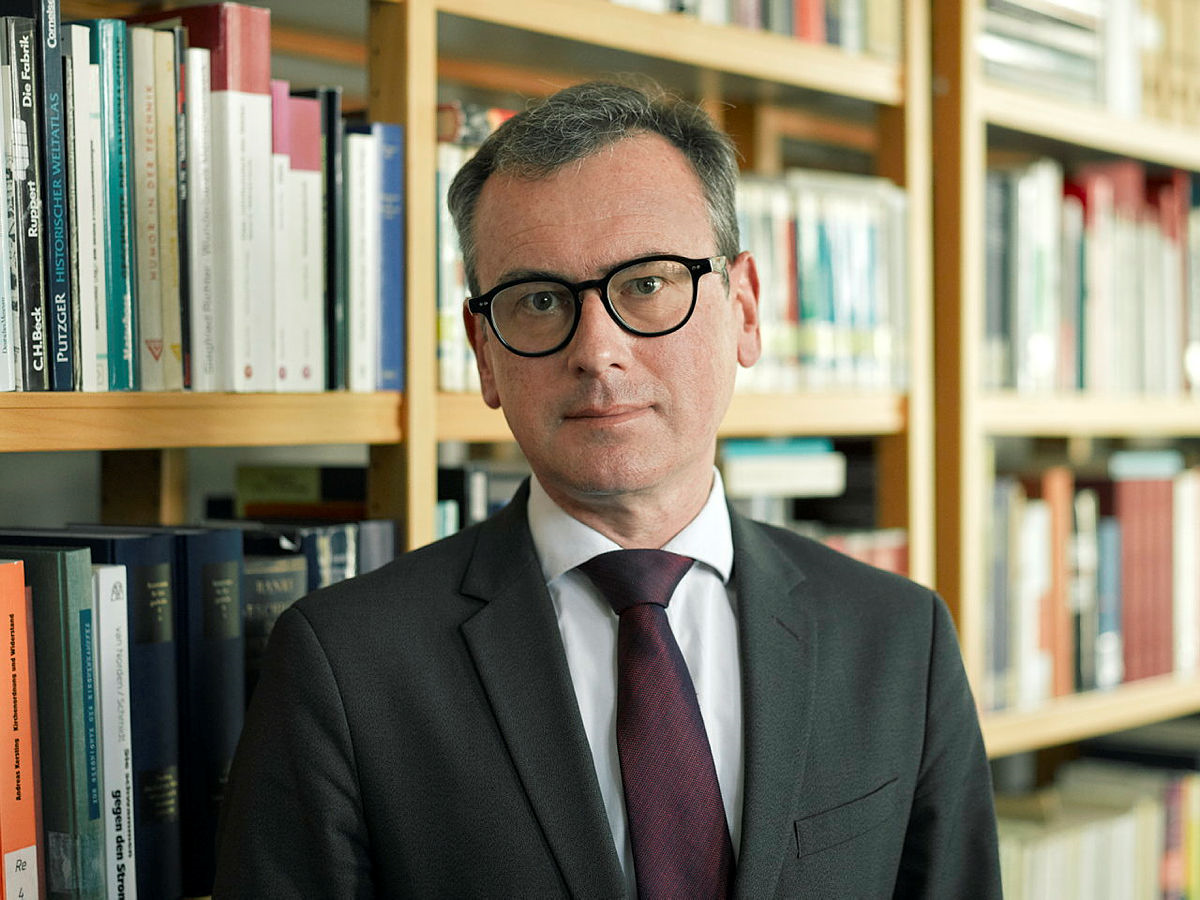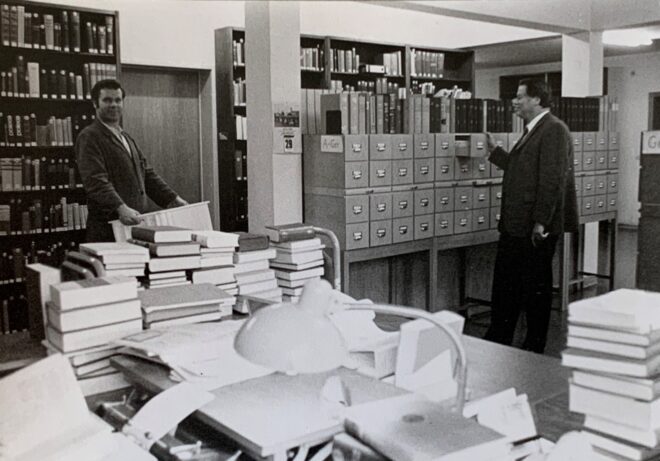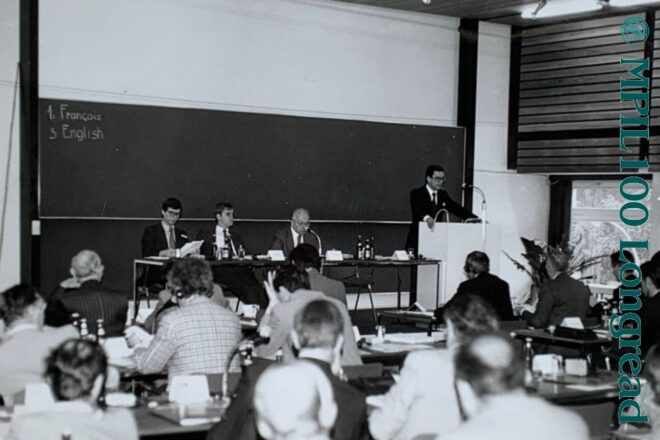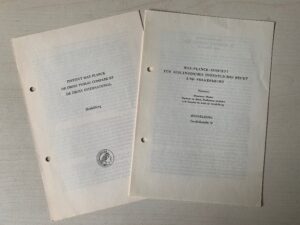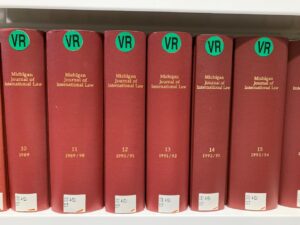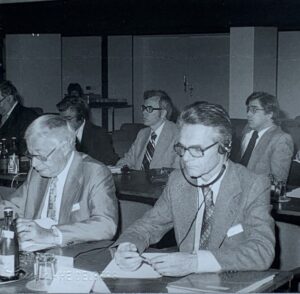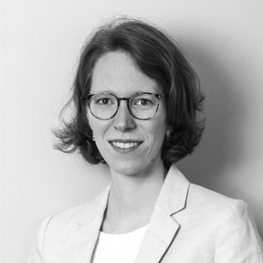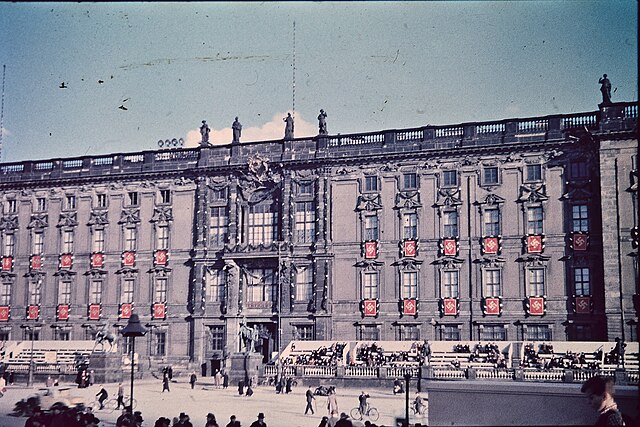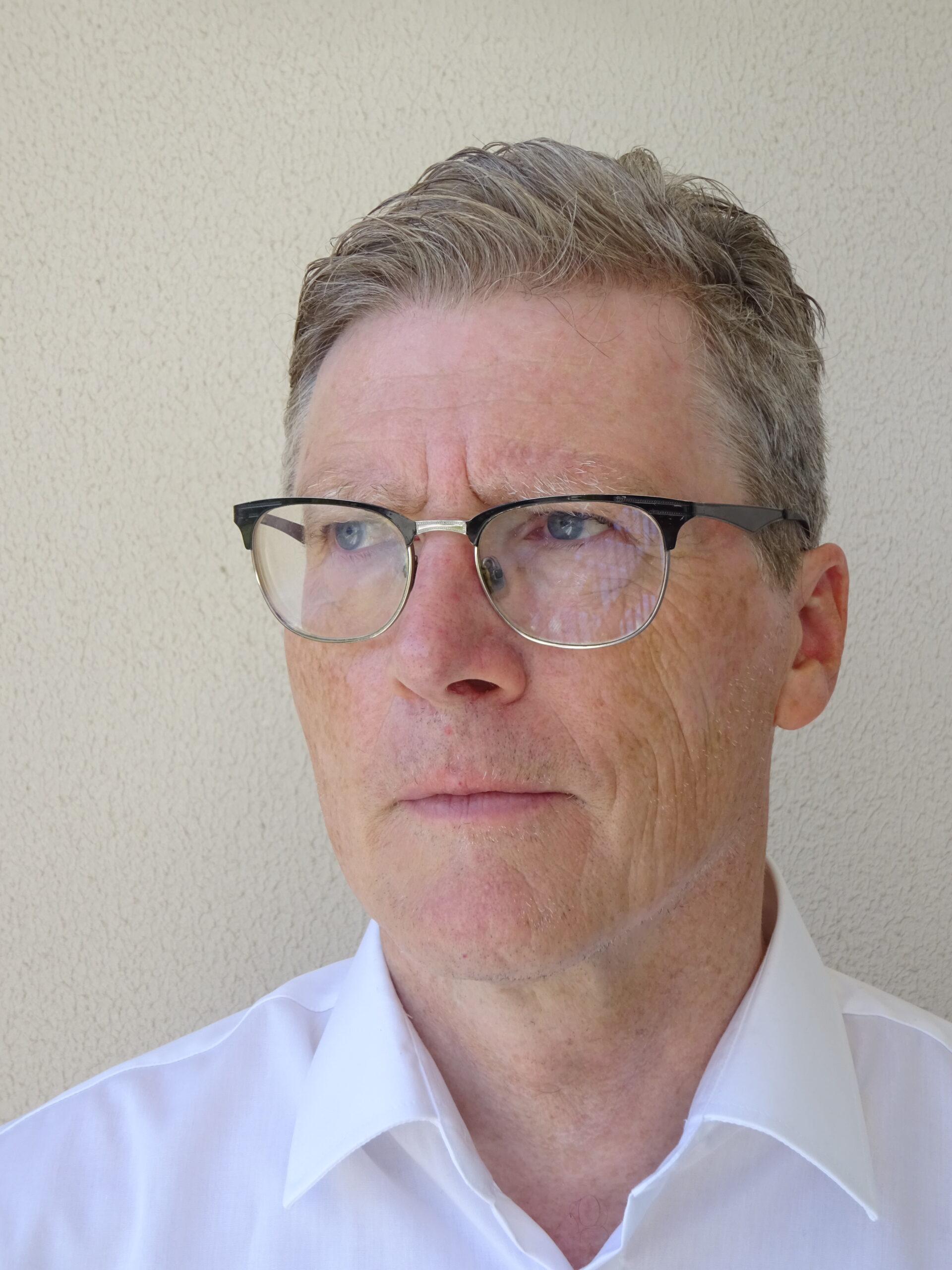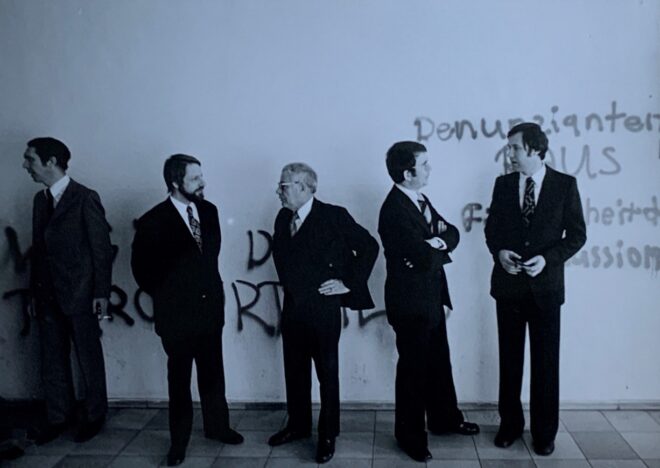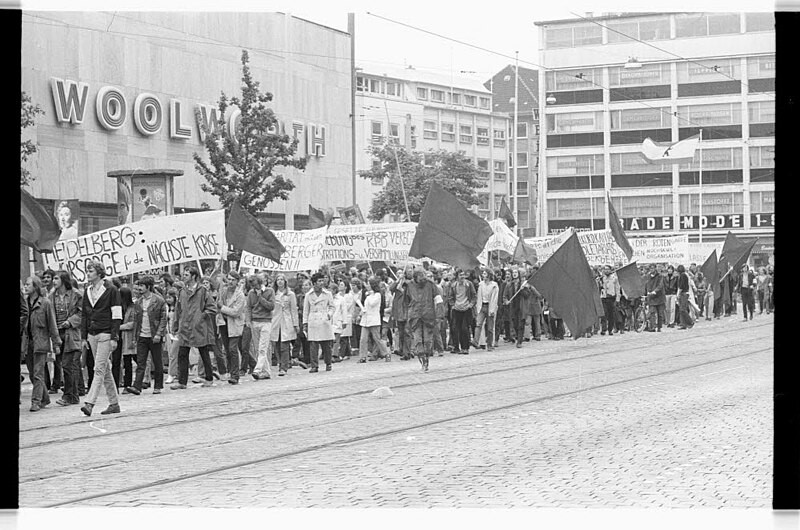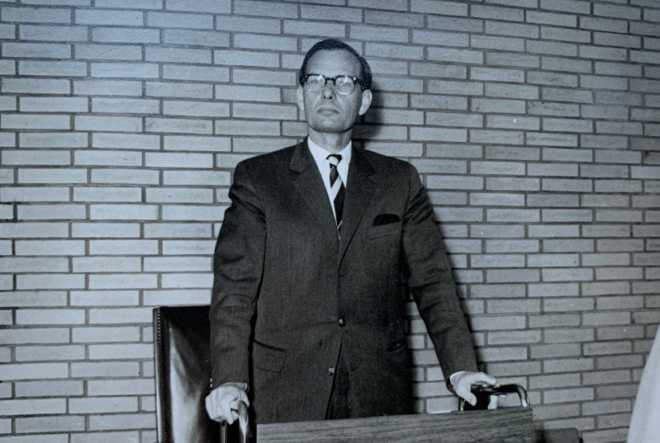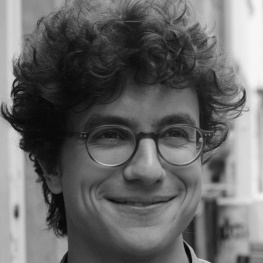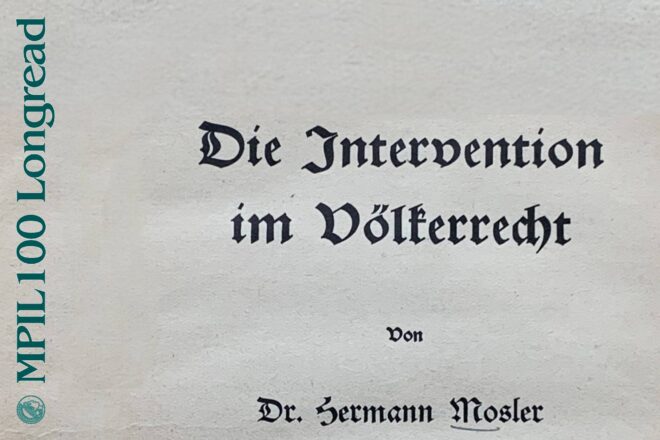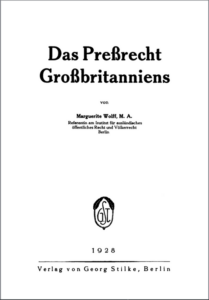Für autoritäre Regierungen kann das Interventionsverbot Fluch und Segen zugleich sein. Einerseits schirmt es die inneren Angelegenheiten eines Staates vor ausländischer Einflussnahme ab. Ein Staat ist daher dazu berechtigt, grundsätzlich frei darüber zu entscheiden, wie er seine politischen, wirtschaftlichen und sozialen Systeme gestaltet. Dies kann vorteilhaft für eine autoritäre Regierung sein, da sie hierdurch den Anspruch erheben kann, unabhängig von äußeren Einflüssen ein autoritäres System aufzubauen und zu verfestigen. Die damit einhergehenden Rechtsverletzungen von Minderheiten und politischen Gegner*innen können als innere Angelegenheit eingestuft werden. Andererseits beschränkt es aber auch den Handlungsspielraum nach außen. Autoritäre Regierungen führen innerstaatliche Probleme häufig auf externe Staaten zurück. In ihrer legitimatorischen Rhetorik bedarf es eines Sündenbocks im Ausland, damit die fortlaufenden Probleme adäquat erklärt werden können und keine Kritik an der Regierungsführung aufkommt. Aufgrund dieser Ausrichtung treten autoritäre Regierungen in ihrer Außenpolitik häufig aggressiver auf und sind im Vergleich zu nicht-autoritäre Regierungen geneigter dazu, Konflikte zu eskalieren. In dieser Hinsicht beschränkt das Interventionsverbot: Es verbietet diesen Staaten eine aggressive und expansive Außenpolitik, welche sich aus ihrer rhetorischen und ideologischen Grundlage ergibt.
Aufgrund dieser Interessenlage kann zumindest in der Gegenwart regelmäßig ein Doppelstandard bei der Berufung auf das Interventionsverbot beobachtet werden. Beispielsweise betont die Volksrepublik China fortlaufend, dass alle Sanktionen, die sich gegen China richten, verbotene Interventionen seien.[1] Dabei hat China selbst Sanktionen gegen US-amerikanische Organisationen und Politiker*innen verhängt, die es für die Proteste in Hong Kong von 2019/20 verantwortlich machte.[2] Die grundsätzliche Position und die konkreten Handlungen Chinas sind nicht miteinander vereinbar und von einem Doppelstandard geprägt.
Ein ähnlich divergentes Spannungsfeld zeigt sich nicht nur in der Außenpolitik autoritärer Staaten, sondern auch in der jeweiligen völkerrechtlichen Forschung. Da völkerrechtliche Forschung von autoritären Regierungen regelmäßig mobilisiert wird, um eigene außenpolitische Positionen zu untermauern, stehen Forschende in ihrer Themenwahl, Quellenwahl und Schwerpunktsetzung teils vor schwierigen Entscheidungen. Selbst wenn sie unter Verwendung völkerrechtswissenschaftlicher Methodik eine objektive rechtliche Bewertung anstreben, kann hierdurch eine Ausrichtung innerhalb des autoritären Forschungskontexts erfolgen und eine Mobilisierung ermöglicht werden. Mit Blick auf das Interventionsverbot können hierbei die drei oben skizzierten Ausrichtungen beobachtet werden. Völkerrechtliche Forschung kann sich gegen jegliche Einmischung in den inneren Angelegenheiten eines Staates richten; dies kann zur Abwehr von ausländischen Einflussnahmen mobilisiert werden. Alternativ kann Forschung die durch das Interventionsverbot gezogenen außenpolitischen Grenzen betonen, welches der Verhinderung autoritärer Exzesse dienen kann. Drittens kann Forschung interventionsrechtliche Doppelstandards ausarbeiten, die als Grundlage einer widersprüchlichen Außenpolitik verwendet werden können.
Die Dissertation von Hermann Mosler aus dem Jahr 1937 mit dem Titel „Die Intervention im Völkerrecht“ enthält Elemente aller drei Ausrichtungen.[3] Die Arbeit entstand in den Jahren 1935 und 1936, als sich die nationalsozialistische Diktatur bereits fest im Deutschen Reich etabliert und Einfluss auf die Wissenschaftslandschaft genommen hatte. 40% aller Völkerrechtler*innen verloren zwischen 1933 und 1939 aufgrund ihrer jüdischen Herkunft oder ihrer politischen Gesinnung ihre Stellung.[4] Die Dissertation entstand daher nicht in einem Kontext, in dem freie Forschung möglich war.
In der bisherigen Rezeption wurde Moslers Konzeption des Interventionsverbots eher der zweiten hier skizzierten Ausrichtung zugeordnet. Mosler habe die NS-Diktatur an das Völkerrecht binden wollen und zudem eine Intervention aus Humanitätsgründen anerkannt.[5] Hierfür finden sich einige Anhaltspunkte, auf die sogleich eingegangen wird (III.). Allerdings betont Mosler auch den umfassenden Charakter des Interventionsverbots, welcher ausländischen Einflussnahmen auf bedeutende Projekte des Nationalsozialismus verbietet (I.). Gleichzeitig legt Mosler seiner Analyse vielfach einen Doppelstandard zugunsten des Deutschen Reichs zugrunde (II.). Die Dissertation von Hermann Mosler kann daher weder als Apologetik des Nationalsozialismus noch als standhafte Abwehr gegenüber dem Nationalsozialismus gewertet werden. Sie ist vielmehr als Produkt einer Zeit zu verstehen, in der Forschung nicht frei war und gewisse revisionistische Positionen in der deutschen Völkerrechtswissenschaft umfassend getragen wurden.

Hermann Mosler (zweiter von rechts) als junger Referent auf dem Dach des KWI (Dach des Berliner Schlosses). Mit Joachim-Dieter Bloch, Ursula Grunow und Alexander N. Makarov (v.l.n.r.)[6]
I. Interventionsschutz für nationalsozialistische Projekte
Nach der Konzeptualisierung im zweiten Teil der Dissertation von Hermann Mosler (S. 38 ff.) schützt das Interventionsverbot bedeutende nationalsozialistische Projekte vor ausländischen Einflussnahmen. Dies soll hier an mehreren Beispielen verdeutlicht werden.
Mosler setzt sich unter anderem mit Einflussnahmen zugunsten nationaler Minderheiten auseinander (S. 56). Nationale Minderheiten erhielten durch völkerrechtliche Verträge der Nachkriegsordnung und Abkommen des Völkerbundes gewissen Schutz. Diese völkerrechtliche Regulierung führte jedoch nach Auffassung Moslers nicht dazu, dass eine Intervention von ausländischen Staaten zum Erhalt der Minderheitenrechte möglich gewesen wäre. Schließlich habe sich hierdurch nichts daran verändert, dass die Staaten die prinzipiellen Rechtssubjekte des Völkerrechts seien und daher exklusiv selbst zur Lösung ihrer jeweiligen Minderheitenfragen berufen waren. Im Anschluss an diese Ausführung erweitert Mosler diese Logik auf Fragen der „Rassengesetzgebung“ (S. 58). Diese müsse erst recht der Intervention anderer Staaten verschlossen sein:
„Lebt aber die rassische Minderheit verstreut im Staatsvolk, so ist ihre rechtliche Stellung der völkerrechtlichen Sphäre noch weiter entzogen und kann n i c h t Gegenstand des Eingriffs auswärtiger Mächte sein.“ (S. 58, Hervorhebung im Original)
Als die Dissertation 1937 veröffentlich wurde, war die systematische Verfolgung von Jüdinnen und Juden durch die „Rassengesetzgebung“ bereits in vollem Gang.[7] Nach Moslers Auffassung handelte es sich hierbei um einen Sachverhalt, der keine ausländische Einflussnahme duldete.
Weiterhin darf nach Auffassung Moslers keine Intervention in der „Wehr- oder Rüstungsgesetzgebung eines Landes“ erfolgen (S. 58). Diese seien „nach Völkerrecht nie als internationale Angelegenheiten betrachtet worden“ (ebda.). Am österreichischen Beispiel der Einführung der Wehrpflicht von 1936 erörtert Mosler, dass ein Staat in dieser Frage völlig frei und diesbezüglich keine Intervention erlaubt sei. Dabei erwähnt Mosler den Versailler Vertrag nicht, obwohl dieser grundsätzliche Aspekte des deutschen Wehr- und Rüstungsrechts regulierte. Insbesondere begrenzte Art. 160 des Versailler Vertrags die Anzahl der deutschen Truppe auf 100.000 Soldaten. Die Lektüre dieses kurzen Absatzes erweckt den Eindruck, dass für Mosler jegliche ausländische Beschränkung dieses Bereichs unzulässig sei. Damit ist auch das nationalsozialistische Aufrüstungsprojekt, das 1937 bereits signifikante Fortschritte machte[8] und völkerrechtswidrig war[9], vom Interventionsschutz gedeckt.
Das „Versailler Diktat“ (S. 78) wird an anderer Stelle abgelehnt und als Negation von Deutschlands Stellung als gleichberechtigtem Staat eingeordnet. Dies entspricht auch der generellen Haltung Moslers[10] sowie dem Zeitgeist in der deutschen Völkerrechtswissenschaft des „Dritten Reiches“[11].
Darüber hinaus widmet sich Mosler nicht dem System der kollektiven Sicherheit des Völkerbundes. Er sieht grundsätzlich keinen rechtlichen Unterschied zwischen Einzelinterventionen durch einen Staat und Kollektivinterventionen mehrerer Staaten (S. 68-69). Das kollektive Element wird als lediglich „politisch und moralisch“ (S. 68) abgetan. Dabei waren Kollektivinterventionen des Völkerbundes zum Zeitpunkt des Verfassens eine zentrale und neue Frage.[12] Die völkerrechtliche Grundlage derartiger Interventionen und ihre möglicherweise gesteigerte Legitimität wären daher von herausgehobenen Interesse gewesen, insbesondere aufgrund der 1935 beschlossenen kollektiven Sicherheitsmaßnahmen gegen Italien im Zuge des sog. „Abessinienkriegs“.[13] In der Systematisierung von Mosler kommen Kollektivinterventionen durch den Völkerbund mithin keine Bedeutung zu.

Hermann Mosler in den 1980ern (Foto: MPIL)
In Moslers Konzeption erstreckt sich daher der Schutz des Interventionsverbots auf bedeutende nationalsozialistische Projekte, insbesondere auf die Verfolgung von Jüdinnen und Juden und die Aufrüstung. Zudem lehnt er die Beschränkungen des Versailler Vertrags ab oder lässt sie an entscheidender Stelle unerwähnt. Dementsprechend wird auch der Völkerbund nicht erwähnt und kollektive Interventionsrechte werden am Rande als unbedeutend abgetan. Diese Konzeption entspricht der ersten hier aufgezeigten Kategorie: Das Interventionsverbot wird von einem autoritären Staat zur Abwehr ausländischer Einflussnahme auf innere Angelegenheiten verwendet, selbst wenn dieser Staat durch Handlungen in seinen inneren Angelegenheiten das Völkerrecht verletzt.
II. Doppelstandards
Weiterhin legt Mosler seinen Bewertungen mehrfach Doppelstandards zugunsten des Deutschen Reichs zugrunde, die von einer selektiven Materialverwendung und fehlender argumentativer Klarheit begleitet werden. Dies verstärkt apologetische Passagen zugunsten des Nationalsozialismus.
Mosler ordnet im Verlauf des Buches immer wieder die Handlungen der Sowjetunion als völkerrechtswidrige Intervention ein. Diese vertrete zwar anlässlich des spanischen Bürgerkriegs (1936-39) den Grundsatz der Nichtintervention, handele diesem aber zuwider, indem sie die Madrider Regierungstruppen unterstütze (S. 73). Gleichzeitig würde die Sowjetunion durch die Komintern und die von ihr verbreitete Propaganda völkerrechtswidrig in anderen Staaten intervenieren (S. 52). Unerwähnt bleibt bei Mosler allerdings, dass das Deutsche Reich dieselben Handlungen vornahm. Im spanischen Bürgerkrieg unterstützte es die Truppen von Francisco Franco und entsandte ab 1936 die Legion Condor, die an mehreren Gräueltaten beteiligt war. Gleichzeitig entwickelte das NS-Regime eine beachtliche Auslandspropaganda, die zum Beispiel im Vorfeld der Annexion des sog. „Sudetenlandes“ den „Anschluss“ vorbereitete[14] und die Saarabstimmung von 1935 intensiv begleitete. Es wäre zu erwarten gewesen, dass auch hierauf hingewiesen würde, zumal Mosler behauptete, dass sich das Deutsche Reich an das Interventionsverbot im Kontext des spanischen Bürgerkriegs halte (S. 54-55).
Weiterhin ist auffällig, dass Mosler überwiegend deutsche und österreichische Staatenpraxis zitiert. Beispielsweise erwähnt er zur Begründung des Propagandaverbots das deutsch-japanische Abkommen von 1936 gegen die Kommunistische Internationale (S. 52, Fn. 49).[15] Die bedeutendere multilaterale Konvention über den Gebrauch des Rundfunks im Interesse des Friedens vom 23. September 1936 bleibt unerwähnt.[16] Diese richtete sich nicht nur gegen sowjetische, sondern auch gegen NS-Propaganda und wurde daher vom Deutschen Reich nicht ratifiziert.[17] Auch die Quellenwahl spiegelt so die Auffassung, dass Interventionen immer nur das sind, was andere Staaten tun.
Dieses Bild wird entschieden dadurch verstärkt, dass sich Mosler auf einer abstrakten Ebene nicht mit dem Interventionsbegriff auseinandersetzt. Er legt weder dar, was unter dem Einsatz von „Macht“ zu verstehen ist, noch was als innere Angelegenheit gilt. Dabei hatte sich der Ständige Internationale Gerichtshof in einem Gutachten von 1923 intensiv mit der Frage auseinandergesetzt, welche Angelegenheiten als innere Angelegenheit zu verstehen sind.[18] Eine Auseinandersetzung mit diesem Gutachten wäre zu erwarten gewesen. Gleichzeitig kommen bei Interventionen verschiedene Intensitäten von „Macht“ in Betracht. Die Verwendung militärischer Gewalt fällt in Moslers Konzeption jedenfalls darunter. Die Verbreitung von Propaganda aber auch. Warum dieses deutlich schwächere Medium den Anforderungen der „Machtschwelle“ genügt, wird nicht erörtert. Da insgesamt dogmatische Auseinandersetzungen mit den Tatbestandsvoraussetzungen des Interventionsverbots ausbleiben, bietet die Dissertation allein kurze Ausführungen zu den jeweiligen Interventionskonstellationen zur Bestimmung des Interventionsverbots. Wie gerade dargelegt, bleibt die Interventionspraxis des Deutschen Reichs hierbei unerwähnt.
Diese Bewertung mit zweierlei Maß verstärkt apologetische Passagen in Moslers Dissertation, die die Kompatibilität des Nationalsozialismus mit dem Völkerrecht hervorheben. In diesem Zusammenhang sind zunächst die sechs Hitler-Referenzen zu erwähnen.[19] Eine Hitler-Rede wird gleich in der ersten Fußnote herangezogen, um die damalige Krise des Völkerrechts zu illustrieren (S. 7, Fn. 1). Darüber hinaus wird Hitler an entscheidenden Stellen zitiert, nicht nur um tatsächliche Gegebenheiten nachzuweisen oder die Position Deutschlands zu erläutern, sondern auch um völkerrechtliche Argumente zu formulieren und untermauern (S. 79, Fn. 55). Diese Zitate wurden bereits von einem Zeitgenossen Moslers kritisch bewertet.[20] Weiterhin widmet sich der dritte Teil der Dissertation (S. 71 ff.) der Kompatibilität des Faschismus und des Nationalsozialismus mit dem Völkerrechtssystem.[21] Die völkische Ausrichtung des Nationalsozialismus wird nicht als Verletzung des Völkerrechts eingeordnet.[22] Schließlich wäre der völkische Ordnungsgedanke im Idealzustand des Gleichlaufs von Volk und Staatsgrenze auch mit dem staatlich geprägten Völkerrecht kompatibel (S. 79). Darüber hinaus verharmlost Mosler die Konsequenzen faschistischen und völkischen Denkens. Eine Rede Mussolinis, in der dieser ankündigt, dass „Innerhalb eines Dezenniums (…) Europa faschistisch oder faschisiert sein [wird]!“ (S. 75), tut Mosler allein als Prognose und nicht als Absichtserklärung ab. Die Ankündigung sieht er nicht als Handlungsplan der faschistischen italienischen Regierung und geht daher auch nicht davon aus, dass diese hieraus ein Interventionsrecht ableitet.
Die Konstruktion des Interventionsschutzes, die mit vielfachen Doppelstandards zugunsten des nationalsozialistischen Deutschlands und der damit verbundenen Apologetik gepaart ist, lässt sich der dritten eingangs beschriebenen Kategorie zuordnen: Das Interventionsverbot wird einerseits als Grenze für ausländische Einmischungen mobilisiert, andererseits sollen die eigenen Handlungen diesem Verbot nicht unterfallen.
III. Intervention als Beschränkung von Exzessen
Neben dem Interventionsschutz für nationalsozialistische Projekte und den Doppelstandards zugunsten des Deutschen Reichs bietet die Dissertation von Hermann Mosler jedoch auch Anhaltspunkte für ein beschränkendes Verständnis des Interventionsverbots. Gerade vor dem Hintergrund des nationalsozialistischen Expansionsprogramm sind diese Aspekte beachtlich.
So spricht sich Mosler entschieden gegen die zwanghafte Änderung von Grenzläufen aus (S. 80), welches dem Kellog-Briand Pakt von 1928 entspricht. Darüber hinaus verbietet seine Konzeption des Interventionsverbots Eingriffe in Minderheitenangelegenheiten. Gerade mit Blick auf die ethnisch-deutsche Bevölkerung im sog. „Sudetenland“ stand dieser Grundsatz der NS-Expansionspolitik diametral entgegen. Diese Elemente können daher als Versuch Moslers interpretiert werden, die NS-Regierung an das Völkerrecht und das Interventionsverbot zu binden. Von den sechs Hitler-Zitaten beziehen sich vier auf die sogenannten „Friedensreden“ von 1935, in denen sich Hitler zumindest verbal zu der Friedensordnung bekennt, aggressive Tendenzen seiner Regierung verneint und die Rechte anderer Völker anerkennt. Diese verbalen Bekenntnisse wurden zwar ab 1937/38 von der Realität überholt. Christian Tomuschat hat jedoch festgehalten, dass bei Erscheinung der Dissertation im Jahr 1937 die Verwendung dieser Reden durch Mosler noch zulässig war und der Bindung des NS-Regimes an das geltende Völkerrecht dienen sollte.[23]

Rudolf Bernhardt und sein Lehrer Hermann Mosler 1961 auf dem Kolloquium „Verfassungsgerichtsbarkeit in der Gegenwart“ (Foto: MPIL)
Darüber hinaus wird in der zeitgenössischen[24] wie neueren[25] Rezeption des Werks hervorgehoben, dass Mosler sich für eine „Intervention aus Gründen der Menschlichkeit“ (S. 61 f.) ausspricht, sofern es zu Verstößen „gegen die elementaren Gesetze der Menschlichkeit“ (S. 63) in einem Staat kommt, kein milderes Mittel besteht und die Intervention nicht zu einer „wesentlich empfindlichere[n] Störung der Rechtsordnung“ (S. 65) führt. In einer kurzen Rezension von 1939 hebt der US-amerikanische Interventionsexperte Ellery Stowell folgendes hervor:
„It is interesting to note in this German text, published before the recent anti-Semitic severities in the Third Reich, the statement that intervention on the ground of humanity is today recognized when occurrences within another state are in blatant opposition to the generally recognized principles of humanity.”[26]
Rudolf Bernhardt sieht in den diesbezüglichen Erörterungen den Schwerpunkt der Arbeit.[27] Durch das Bekenntnis zur Humanitätsintervention hätte sich Mosler zu einer möglichen ausländischen Intervention gegen das Deutsche Reich bekannt, sofern es in der Zukunft zu schwereren Verletzungen der Menschlichkeit kommen würde. In Moslers Sinne könne das Interventionsverbot nicht gegen exzessive Verletzungen der Menschlichkeit bestehen.
Zwar ist zweifelhaft, inwiefern 1937 eine derartige Position noch vertretbar war. Schließlich sah Mosler die Kriterien für eine Humanitätsintervention noch nicht gegeben, obwohl die Nürnberger Rassengesetze von 1935 und die damit verbundene Jüd*innenverfolgung, die entschiedene Aufrüstung und Einführung der Wehrpflicht ab 1935, die revisionistischen Tendenzen bezüglich der deutschen Grenzen und des Versailler Vertrags (unter anderem durch die Besetzung des Rheinlands 1936) und die aggressive außenpolitische Haltung[28] bereits zu diesem Zeitpunkt auftraten. Dennoch kann Mosler zugutegehalten werden, dass er das Interventionsverbot nicht verabsolutiert und damit auch die völkerrechtliche Möglichkeit einer Intervention gegen das Deutsche Reich offenhält, sofern dieses elementare Grundsätze der Menschlichkeit verletzt.
Die Dissertation von Mosler enthält somit auch Aspekte, die sich der zweiten eingangs skizzierten Ausrichtung zuordnen lassen: Das Interventionsverbot wird vor die Expansionspolitik des Deutschen Reichs gestellt, eine gewaltsam Grenzverschiebung abgelehnt. Gleichzeitig wird der Interventionsschutz nicht als vollumfänglich dargelegt und die Möglichkeit zur Humanitätsintervention eröffnet.[29]
IV. Fazit
Gerade in der Anfangszeit des NS-Regimes wurden völkerrechtliche Forschungsergebnisse in der NS-Außenpolitik dazu verwendet, das Deutsche Reich als weiterhin berechenbaren Staat und verlässlichen internationalen Akteur darzustellen.[30] Die bereits genannten revisionistischen Maßnahmen wurden auf Grundlage wissenschaftlich erarbeiteter Argumentation nach außen hin „plausibel“ begründet und konnten so zunächst den Schein erwecken, dass das nationalsozialistische Deutschland die Völkerrechtsordnung zumindest grundsätzlich achten würde. Diese dienende Funktion völkerrechtlicher Forschung ist typisch für autoritäre Staaten. Forschende in diesen Kontexten können daher, selbst wenn sie eine objektive rechtliche Bewertung anstreben, durch Schwerpunktsetzung, Themen- und Quellenwahl einer bestimmten Mobilisierung ihrer Forschungsergebnisse Vorschub leisten.
Daher sind Ausrichtung und Konzeptualisierung von Hermann Moslers Dissertation kritikwürdig. In seiner Konzeption werden bedeutende Projekte des NS-Regimes durch das Interventionsverbot vor äußeren Einflüssen abgeschirmt. Das Deutsche Reich konnte sich auf seine völkerrechtliche Stimme beziehen, wenn sie ausländische Kritik an der Jüd*innenverfolgung oder der Aufrüstung als Intervention zurückwies. Auf Basis von Moslers völkerrechtlicher Positionierung konnte das Regime ohne Rücksicht auf ausländische Bedenken den Angriffskrieg gegen mehrere europäische Staaten und den systematischen Massenmord an Jüdinnen und Juden vorbereiten. Selbst wenn diese Folgen 1937 noch nicht gänzlich absehbar waren, ist eine hierzu dienende und ermöglichende Konzeptualisierung des Interventionsverbots nur schwer zu rechtfertigen.
Allerdings kann auch nicht darüber hinweggesehen werden, dass Moslers Position dem völkerrechtswissenschaftlichen Zeitgeist der Mitte der 1930er Jahre entsprach. Die Ablehnung des Versailler Vertrags und eine gewisse Affinität zur NS-Außenpolitik, die eine Revision von Versailles anstrebte, waren unter deutschen Völkerrechtler*innen der 1930er weit verbreitet.[31] Zudem bestand, zumindest vor 1938, eine große Bereitschaft über kritische Aspekte des NS-Projekts hinwegzuschauen.[32] Dass sich diese Elemente auch in der Dissertation von Mosler wiederfinden, verwundert daher nicht, zumal eine risikolose Abweichung von diesem Forschungskonsens im damaligen autoritären Forschungskontext[33] einem aufstrebenden Nachwuchswissenschaftler in der Position Moslers nur schwer möglich war.
Aufschlussreich ist daher der genaue Blick auch auf die anderen Aspekte der Arbeit. Mosler versuchte die NS-Regierung an einen Interventionsbegriff zu binden, der außenpolitische Exzesse verhindern würde. Insbesondere das Bekenntnis gegen die gewaltvolle Verschiebung von Grenzen stand der NS-Expansionspolitik entgegen. Hierdurch setzte sich Mosler auch von anderen Zeitgenossen ab, die sich klar zugunsten des NS und seiner Expansionspolitik aussprachen. Mosler bekannte sich zu keinem Zeitpunkt ausdrücklich zum NS und wurde nicht NSDAP-Mitglied. Zudem stellt allein die von ihm eingeräumte Möglichkeit zur Humanitätsintervention eine Beschränkung des sonst sehr umfassenden Interventionsschirms dar.
Die Dissertation von Hermann Mosler lässt sich im Ergebnis keiner der drei oben skizzierten Ausrichtungen zweifelsfrei zuordnen. Für alle drei bestehen Anhaltspunkte. Gerade vor dem Hintergrund aktueller interventionsrechtlicher Debatten zeigt seine Arbeit jedoch, wie bestimmte wissenschaftliche Schwerpunktsetzungen einer politischen Mobilisierung dienen können, selbst wenn der Autor eine objektive Bewertung der Völkerrechtslage anstrebt.
[1] The Commissioner’s Office of China’s Foreign Ministry in the Hong Kong S.A.R, Say No to Unilateral Sanctions and Jointly Uphold the International Rule of Law, Keynote Speech by H.E. Mr. Xie Feng Commissioner of the Ministry of Foreign Affairs of China in the Hong Kong Special Administrative Region at the Opening Ceremony of 2020 Colloquium on International Law, 04.12.2020, online: <www.mfa.gov.cn/ce/cohk/eng/zydt/t1838003.htm>, zuletzt abgerufen am 23.02.2022.
[2] China sanctions four with U.S. democracy promotion ties over Hong Kong, Reuters, 30.11.2020, online: <www.reuters.com/article/us-usa-china-hongkong-sanctions-idUSKBN28A0RH>, zuletzt abgerufen am 24.02.2022.
[3] Hermann Mosler, Die Intervention im Völkerrecht – Die Frage des Verhältnisses von Souveränität und Völkergemeinschaft, Berlin: Juncker und Dünnhaupt 1937; Die Dissertation entstand 1935 und 1936 bei Richard Thoma an der Universität Bonn.
[4] Ingo Hueck, Die deutsche Völkerrechtswissenschaft im Nationalsozialismus. Das Berliner Kaiser-Wilhelm-Institut für ausländisches öffentliches Recht und Völkerrecht, das Hamburger Institut für Auswärtige Politik und das Kieler Institut für Internationales Recht, in: Doris Kaufmann (Hrsg.), Geschichte der Kaiser-Wilhelm-Gesellschaft im Nationalsozialismus. Bestandaufnahme und Perspektiven der Forschung Bd.2, Göttingen: Wallstein 2000, 490-528, 492.
[5] Christian Tomuschat, Rede zum 50. Doktorjubiläum von Hermann Mosler, gehalten am 12. November 1987, in: Bonner akademische Reden, Bd. 69, Bonn: Bouvier 1989, 10 ff.; Rudolf Bernhardt, Die Rückkehr Deutschlands in die Internationale Gemeinschaft, Der Staat 42 (2003), 583-599, 585; Christian Tomuschat, Hermann Mosler (1912-2001), in: Peter Häberle/Michael Kilian, Heinrich Amadeus Wolff (Hrsg.), Staatsrechtslehrer des 20. Jahrhunderts, Berlin: De Gruyter 2014, 959; Felix Lange, Praxisorientierung und Gemeinschaftskonzeption – Hermann Mosler als Wegbereiter der westdeutschen Völkerrechtswissenschaft nach 1945, Beiträge zum ausländischen öffentlichen Recht und Völkerrecht Bd. 262, Heidelberg: Springer 2017, 64; 105-106.
[6] VI. Abt., Rep. 1, Nr. KWIauslöffRechtuVölkerrecht III/51.
[7] Einzelne Aspekte hiervon wurden in der Zeitschrift für ausländisches öffentliches Recht und Völkerrecht immer wieder verteidigt, siehe: Berthold Schenk Graf von Stauffenberg, Die Entziehung der Staatsangehörigkeit und das Völkerrecht, ZaöRV 4 (1934), 261-277.
[8] Auch die deutsche Aufrüstung unter Verletzung des Versailler Vertrags wurde in der ZaöRV gerechtfertigt, siehe: Viktor Bruns, Der Beschluß des Völkerbundsrats vom 17. April 1935, ZaöRV 5 (1935), 310-316.
[9] Hueck (Fn. 4), 516.
[10] Lange (Fn. 5), 105.
[11] Detlev F. Vagts, International Law in the Third Reich, AJIL 84 (1990), 661-704, 670.
[12] Hans Wehberg, Die Reform des Völkerbundes, Die Friedens-Warte 36 (1936), 204-206; Edgar Tatarin-Tarnheyden, Völkerrecht und organische Staatsauffassung, Archiv für Rechts- und Sozialphilosophie 29 (1936), 295-319.
[13] Zur Diskussion hierum siehe: Wehnberg (Fn. 12) und weiter: Quincy Wright, The Test of Aggression in the Italo-Ethiopian War, AJIL 30 (1936), 45-56.
[14] Hueck (Fn. 4), 497-98; Peter Longerich: Propagandisten im Krieg. Die Presseabteilung des Auswärtigen Amtes unter Ribbentrop, Studien zur Zeitgeschichte Bd. 33, Berlin: De Gruyter 1987, 46 ff; Beispielsweise im Vorfeld der Annexion des „Sudetenlands“, siehe: Schreiben des tschecho-slowakischen Gesandten in London an den britischen Außenminister, datiert 25. September 1938, abgedruckt in: Friedrich Korkisch, Dokumente zur Lösung der Sudetendeutschen Frage, ZaöRV 8 (1938), 759-788, 776.
[15] Abkommen gegen die Kommunistische Internationale v. 25. 11. 1936, RGBl. II 1937, 28.
[16] International Convention Concerning the Use of Broadcasting in the Cause of Peace v. 23. 9. 1936, UNTS 186, 301; siehe ausführlich zu diesem Abkommen: Björnstjern Baade, Fake News and International Law, EJIL 29 (2019), 1357-1476, 1365; Henning Lahmann, Information Operations and the Question of Illegitimate Interference under International Law, Israel Law Review 53 (2020), 1-36, 7.
[17] Baade (Fn. 16), 1366.
[18] StIGH, Nationality Decrees Issued in Tunis and Morocco, Advisory Opinion v. 7. 2. 1923, Series B, No. 23-24.
[19] Insgesamt sechs Zitate auf S. 6, 77, 78, 79.
[20] Kritik von Wilhelm Wengler wiedergegeben bei Lange (Fn. 5), 105.
[21] Eine andere Interpretation dieses Teils vertritt Lange (Fn. 6), 106-7. Er sieht hierin einen Versuch Moslers den Nationalsozialismus an das Völkerrecht zu binden, indem er darlegt, weshalb die nationalsozialistische Position weitestgehend dem Völkerrecht entspricht.
[22] Dabei beruhte die völkische Ausrichtung des Nationalsozialismus auf einer Über- und Unterordnung verschiedener „Rassen“. Eine Gleichberechtigung verschiedener in Staaten konstituierter Völker ist unter dieser Prämisse nicht möglich und damit eine Negation des souveränitätsbasierten Völkerrechts.
[23] Bernhardt (Fn. 5), 585; Tomuschat, Mosler (Fn. 5), 959.
[24] Ellery C. Stowell, Humanitarian Intervention, AJIL 33 (1939), 241.
[25] Tomuschat, Mosler (Fn. 5), 959; Bernhardt (Fn. 5), 584; Lange (Fn. 5), 64; 105-106.
[26] Stowell (Fn. 24), 241.
[27] Bernhardt (Fn. 5), 584 f.
[28] Lange (Fn. 5), 37; Tomuschat, Rede (Fn. 5), 10.
[29] Ob eine Humanitätsintervention gegen das Deutsche Reich nach 1937 zulässig gewesen wäre, hat Mosler nie beantwortet. Nach der Dissertation hat er – ausweislich seines Schriftenverzeichnisses – nicht wieder zum Interventionsverbot publiziert, siehe: Roger Bernard et al. (Hrsg.), Völkerrecht als Rechtsordnung, Internationale Gerichtsbarkeit, Menschenrechte: Festschrift für Hermann Mosler, Beiträge zum ausländischen öffentlichen Recht und Völkerrecht Bd. 81, Heidelberg: Springer 1983, 1049-1057.
[30] Vgl. Rüdiger Hachtmann, Das Kaiser-Wilhelm-Institut für ausländisches öffentliches Recht und Völkerrecht 1924 bis 1945, MPIL100, online: <mpil100.de/2023/12/das-kaiser-wilhelm-institut-fuer-auslaendisches-oeffentliches-recht-und-voelkerrecht-1924-bis-1945/>, zuletzt abgerufen am: 21.12.2023; Lange (Fn. 5), 37: „Indem die Völkerrechtswissenschaft sich grundsätzlich für die Einhaltung völkerrechtlicher Bindungen stark machte, stärkte sie das Bild eines berechenbaren und kontrollierbaren Regimes gegenüber dem Ausland.“; Hueck (Fn. 4), 514.
[31] Hueck (Fn. 4), 525.
[32] Hueck (Fn. 4), 525.
[33] Hueck (Fn. 4), 492.
Florian Kriener ist wissenschaftlicher Referent am Max-Planck-Institut für ausländisches öffentliches Recht und Völkerrecht.
Florian Kriener is Senior Research Fellow at the Max Planck Institute for Comparative Public Law and International Law.


